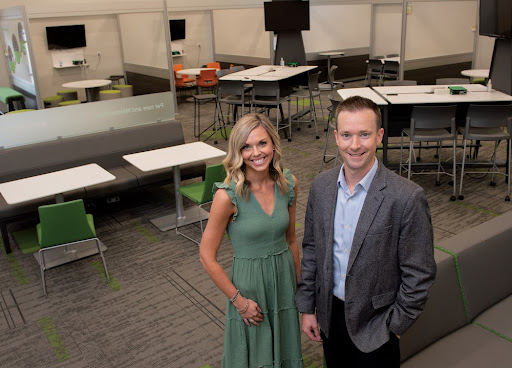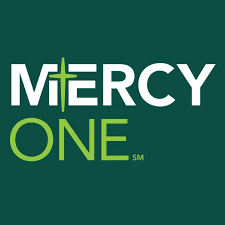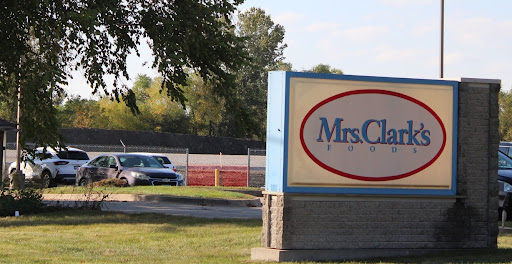JA Finance Park rolls out financial literacy programs for Central Iowa students
New offering expected to serve about 6,000 teens annually

BPC Staff Oct 15, 2021 | 8:14 pm
7 min read time
1,636 wordsAll Latest News, Banking and Finance, EducationJunior Achievement of Central Iowa’s Shannon Gerard and Ryan Osborn at the new JA Finance Park space. Photo by Duane Tinkey
A school day spent at Junior Achievement of Central Iowa’s JA Finance Park can be an eye-opening experience for students regarding earning and spending money. Through the brand-new program that kicked off earlier this month, students pick up valuable budgeting and money management skills they might not have realized they’ll need when they venture out into their first full-time jobs.
The new program — a substantial complement to the popular JA BizTown curriculum that Junior Achievement has offered for elementary students for a number of years — is much more than a personal-finance simulation, said Ryan Osborn, president of JA of Central Iowa.
“What it’s really about is connecting the dots between the lifestyle you want and how much net monthly income you need to support that,” he said. “What kind of jobs, what kind of career paths are there, and what kind of earning potential do they have? And then we keep walking it all the way back to where they are today, so they know what kind of training, education and skills that will make them marketable and eligible for those jobs.”
The program will also help school districts meet the state’s new financial literacy curriculum requirements. Beginning with the graduating class of 2020-21, Iowa students are required to take one semester of personal finance literacy as part of their graduation requirement.
Osborn estimates the JA Finance Park program covers about 60% of the financial literacy requirements. “We’re still tweaking it a little bit, but there are a couple other JA programs you can do that will get you almost all the way to 100%,” he said. “What we have found with the teachers is they have a certain curriculum that already covers some of it, so our role is having to come in and bridge the gap for them by doing a program like JA Finance Park.”
About 50 eighth grade students from Norwalk Middle School participated as the first class to rotate through the program recently. The school-day experience was the ribbon that tied together several weeks of financial literacy instruction provided by their teacher In the classroom.
“We’ve been working through all those little units since the beginning of the school year,” said Hilary Lucas, an eighth grade teacher at Norwalk Middle School. Lucas said she particularly liked the shopping simulation at the end of the day that tied it all together. “It was a nice finish for them.”
Small groups of students rotated among several learning “pods” in the recently remodeled area of Junior Achievement’s education center at 6100 Grand Ave. in Des Moines. The space, previously an auditorium, was completely refurbished into an airy room that can handle about 70 students at a time. Over time, the new JA Finance Park program is expected to grow to serve between 5,000 and 6,000 students a year.
“We thought if we were going to run Finance Park, it needed its own space,” Osborn said. “We couldn’t share the BizTown space. About 8,000 students come through BizTown [annually] and that really puts it at capacity.” With the potential draw that JA Finance Park will have, Junior Achievement’s on-site capacity could quickly increase to upwards of 14,000 students annually.
“We’re not planning to fill [JA Finance Park] the first year,” he said. “We may get a couple of thousand students to come experience it this first year, and then as awareness grows we hopefully will fill it someday, like BizTown has done over the years.”
While some Junior Achievement chapters in other cities have spent $10 million or more on facilities to house JA Finance Park, that large of a capital investment wasn’t feasible for the Des Moines nonprofit. A creative remodeling of the outdated auditorium space enabled the organization to create a new space for about $800,000, “a figure that we’re really proud of,” Osborn said.
Coincidentally, Norwalk received JA’s District of the Year Award for its involvement with Junior Achievement last year, said Shannon Gerard, senior manager for experiential learning with JA Central Iowa. “Before we had this facility built, there was a virtual option for Finance Park, and their eighth grade teacher [Lucas] did that last year. So it was kind of a natural fit to have them continue and be our first one this year in the new space.”
Other schools that are signed up include some from the Diocese of Des Moines — Holy Trinity, Sacred Heart and St. Francis, Gerard said. Also, Winterset is signed up, and Woodward-Granger is going to do the virtual option, she said.
“We’re talking to Des Moines Public Schools about hopefully getting a large chunk of their kids to come in the spring semester,” said Gerard, who before joining JA taught in the Des Moines schools for five years. “So there is growing awareness of it, and hopefully more districts will get on board as they hear about it.”
The program includes a minimum of 18 instructional hours, but the teachers have a lot of options to do extension activities, she said. “So some teachers spend a lot more time on the curriculum, and we love that. But we understand that schools are time-bound and they have a lot to get into.”
Norwalk’s Lucas said she was impressed that JA Finance Park featured volunteers from sponsoring businesses who came in to assist at each pod, with each providing a presentation about various categories of the household budget.
“The one that stood out the most to me was the pod that talked about paying for groceries and other common expenses,” Lucas said. “The students were just blown away by how much money they would have to pay for groceries for a certain size of family. The comment that I kept hearing was, ‘I just didn’t know things would cost this much.’”
Although JA Finance Park is open to students in grades seven to12, the “sweet spot” is right around eighth grade, Gerard said. “There’s actually an entry-level option that is a more simplistic version of the software, and then there’s an advanced version for the older students who maybe have some personal finance skills already from different classes that they’ve taken.”
JA Finance Park provides a great opportunity for students to return to Junior Achievement a few years after completing their BizTown experience, Osborn said. “We’ve always asked ourselves, ‘How can we get the kids to continue to come back on-site to experience another hands-on learning opportunity?’ The Finance Park is an awesome fit for that because it is for older students and gives them an opportunity to come back on-site.”
The new program fits together strategically with a new JA Pathways program in which students can begin earning badges and certifications for the amount of JA they participate in, Osborn said. “So what excites us the most is building that pathway to keep them involved with Junior Achievement that way.
“This program will add a lot of energy to the overall program and really help keep JA at the top of mind for people,” Osborn added. “With the financial literacy bill, it’s a topic that’s more top of mind for educators, and we really hope they see JA as a partner that can help them with that.”
Junior Achievement of Central Iowa’s president, Ryan Osborn, answers additional questions about the new program and provides an update on the organization:
How is JA Finance Park funded?
It’s partially funded by the schools, and the rest is made up by sponsorships. It costs JA around $50 per student to run the program between the staff, materials and other expenses. The most the school will be paying is about 20% to 30% of that. The amount that schools pay is based on the percentage of their students on the free and reduced-price lunch program; schools with a high percentage of low-income students may pay as little as $2 per student, with sponsorship funds providing the difference.
Will Des Moines’ status as an insurance hub ensure a lot of potential sponsors?
We’re hoping that’s the case because we do need the sponsors, of course, to fund the annual operations. But the other difference with Finance Park is we are counting on more corporate volunteers from those companies. With BizTown, a lot of parents come and volunteer, and we’ll certainly welcome and hope a lot of parents sign up for Finance Park, too. We’re also under the impression that having the word “finance” in the title might scare away some parents, even though we train them and they don’t need to know anything about financial training. But what we are really counting on is a lot of corporate volunteers from the banks, the financial services industry. But really, any company, big, medium or small, can come volunteer here because again, we do all the training.
What was the impact from COVID on Junior Achievement last year?
From a revenue standpoint we were down by about 30% [last year] from where we typically would have been, but we budgeted for that and we can survive that kind of storm. From a student impact standpoint, we’re certainly down. I wouldn’t say half, but pretty close to that. Part of that is just that we weren’t really able to host a lot of on-site programs. But the cool thing about BizTown is that there was a digital version created, and Shannon [Gerard of JA Central Iowa] did a great job letting teachers know about that. We still had close to 4,000 students take what we called BizTown Online Adventures. … We ended up with a little over 10,000 students overall last year.
Learn more in the Oct. 22 issue of the Business Record.










